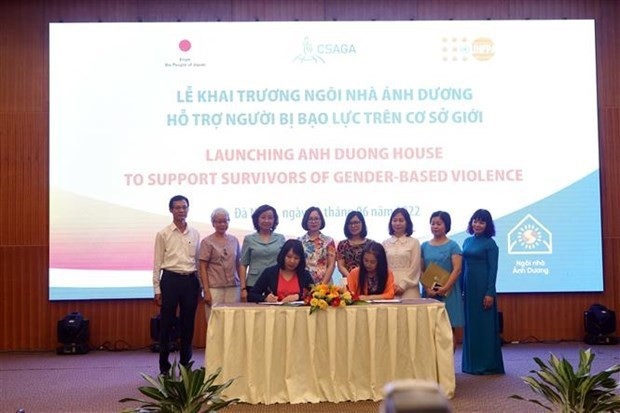 At the ceremony to launch "Anh Duong House" to support survivors of gender-based violence in Da Nang. (Photo: VNA)
At the ceremony to launch "Anh Duong House" to support survivors of gender-based violence in Da Nang. (Photo: VNA) Hanoi (VNA) - The Korea International Cooperation Agency (KOICA) and theUnited Nations Population Fund (UNFPA) have pledged to undertakethe follow-up activities of building a model in response to violence againstwomen and girls in Vietnam.
Country Director of KOICA Vietnam Cho Han Deog and UNFPA Representativefor Vietnam Naomi Kitahara signed a grant arrangement in Hanoi on July 15,under which KOICA will provide financial support of 250,000 USD to UNFPA.
The grant aimsto ensure the sustainability of the innovative One Stop Service Centre model,which is commonly known as “Anh Duong House” in Vietnam. The House was first establishedin April 2020 through the KOICA-funded project “Building a model to respond toviolence against women and girls in Vietnam,” for the period of 2017 – 2021 with a total budget of 2.5 million USD.
The grant arrangement covers a bridge phase through 2023, when a new and larger project is expected to be launched. It looksto continue supporting Anh Duong House and its hotline for victims of violence,and to organise outreach communication activities and advocacy efforts to sustainand replicate the model in other locations.
UNFPA willwork in partnership with the Ministry of Labour, Invalid and Social Affairs andQuang Ninh province to implement the activities to ensure the continuousprovision of integrated essential services for survivors of gender-basedviolence.
Speakingat the signing ceremony, Cho Han Deog said during his recent visit to Anh DuongHouse in Quang Ninh, he observed how the House has effectively provided supportand helped vulnerable women and girls.
He said: “KOICA has decided to continuesupporting Anh Duong House in Quang Ninh as it has made significantcontributions to the efforts made by the Vietnamese Government and by the localauthorities of Quang Ninh to address gender-based violence and domesticviolence. We want this model to be replicated in other locations. At KOICA, we embrace a zero-tolerance culture that says NO to any formsof gender-based violence.”
Anh Duong Housebecame fully operational in April 2020, providing a wide range of services suchas health care, psychological support, counselling, social welfare services,emergency shelters, police protection, legal and justice services, andreferrals for many gender-based violence survivors, not only in Quang Ninh butalso in 20 cities and provinces throughout the country.
Anh DuongHouse’s hotline service, which is available 24/7, has so far received more than15,300 calls in two years. Most survivors of violence who have called the hotline are female(accounting for 93.6%), and most gender-based violence survivors are aged16–59. Minors under the age of 16 account for 10% of calls. About 20% of callscame from Quang Ninh province and 80% from other provinces.
In addition, nearly 500 service providers from police, justice, health,and social work from both provincial and grassroots levels in Quang Ninh,received training for the provision of essential services for gender-basedviolence survivors. With technical support from UNFPA,Anh Duong House hasbeen duplicated in Thanh Hoa, Ho Chi Minh City and Da Nang.
In herremarks at the signing event, Naomi Kitahara said UNFPA will make sure that thefunds from KOICA will be used effectively. UNFPA will continue to work closelywith Vietnamese partners to implement the bridge-phase activities of the projectat the national level and in Quang Ninh province.
She addedthat zero-based violence and harmful practices is one of the three main pillarsin the new UNFPA Strategic Plan for 2022-2025, and a clear priority for theUNFPA Vietnam’s new country programme 2022-2026.
“UNFPA willscale up efforts to end gender-based violence and harmful practices inVietnam,” she said.
Gender-basedviolence is a manifestation of gender inequality which is deeply rooted inVietnam. According to the 2019 national study on violence against women, nearlytwo in three women aged 15 – 64 experienced at least one form of physical,sexual, psychological and/or economic violence in their life time. Gender-basedviolence is very much hidden in society, when more than 90 percent did not seekany help from public services, and half of the women who experienced violencetold no one about it. It is costingVietnam 1.81 percent of GDP, which is significant./.


























